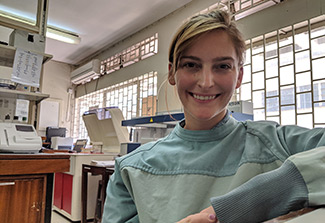Improving the oral health of Kenyan teens living with HIV
September / October 2022 | Volume 21 Number 5

People living with HIV/AIDS often experience oral health issues, including tooth decay, painful sores and blisters, and periodontitis (bone loss around the teeth). Antiretroviral therapy (ART), a form of HIV treatment, has made these problems less common yet the medications themselves sometimes cause dental side effects. The Children’s HIV Oral Manifestations Project (CHOMP) is examining the relationship between oral disease, saliva, blood levels of vitamin D, and a patient’s overall quality of life.
Ashley Karczewski joined CHOMP to better understand these complex oral dynamics in teens affected by HIV in Kenya, home to approximately 150,000 children living with HIV/AIDS. “Oral manifestations of HIV can greatly impact quality of life for these children. If they have tooth pain, they miss school. Sometimes malnutrition results if they lose teeth or have trouble chewing,” said Karczewski. For her Fogarty project, she focused on levels of antimicrobial peptides (AMPs) found in saliva that are protective of oral health.
Microbes in our mouths
Our mouths are home to between 300 and 700 different bacterial species and our saliva contains AMPs that modulate this thriving community of organisms. AMPs benefit our health by boosting immunity and helping to prevent oral disease.
“What we found was that there was a correlation between the vitamin D status of the children and the salivary AMP cathelicidin LL-37—but it was the opposite of what we’d anticipated,” said Karczewski. Children with adequate vitamin D status had less, not more LL-37. The team’s theory is that vitamin D is a precursor to LL-37. So children with more LL-37 may have expended more vitamin D to produce their high levels of the beneficial AMP. “We also found a correlation to the ART regimen,” said Karczewski. “Children who began receiving ART earlier in life had higher levels of LL-37 and another AMP. So that means ART was likely helpful in boosting their immune systems.”
The results were not as straightforward as the CHOMP team anticipated, calling into question, among other issues, the integrity of the samples. “COVID-19 hit just when we were ready to ship our samples to the United States for analysis, so they got stuck in the freezer for a lot longer than we’d planned,” said Karczewski. Still, CHOMP, a collaboration that began four years ago between the University of Washington and the University of Nairobi, continues working towards its aims.
“The goal is to gather data and then do a big clinical trial, where we provide vitamin D supplementation as a way of boosting the innate immunity of children living with HIV.” The trial should begin in about two to three years and, if the results are beneficial, a similar cost-effective vitamin D supplementation plan “can be applied in other nations, whether low, middle or high income,” said Karczewski. “Because cancer, diabetes, hypertension, and other health issues create a compromised oral environment, vitamin D supplementation would be helpful to many people.” Currently, the CHOMP team is preparing to publish a series of papers analyzing their results.
Karczewski received instruction on research methodology, grant and paper writing, and Institutional Review Boards (IRBs) through her fellowship. “One positive of the pandemic is it allowed me to focus on writing and career development," she said. “We had bi-weekly consortium calls to discuss different topics and to hold workshops on grant and paper writing. Previously I'd done only bench research so this was like a PhD-lite year for me." The disruption caused by SARS-CoV-2 also taught her “resiliency in the face of dealing with the limitations of a global pandemic. I was working with a huge team and coordinating between all these different people and moving parts.” Her Kenyan and U.S. mentors provided much-needed guidance. All told, Karczewski found being on her own in Nairobi to be “a huge leap personally. I learned some Swahili, some Kenyan cooking and joined a cycling group.”
Since her Fogarty Fellowship, Karczewski has finished dentistry school and begun a residency in a cancer center. “What I learned in Nairobi helped me with all my patient interactions and also with my focus on medically compromised people.” The Timothy A. DeRouen Center for Global Oral Health at the UW School of Dentistry recently hired her for more project help. “For two weeks in May, I worked as the REDCap subject matter expert in Peru. We also have another project in Mombasa, Kenya.” (REDCap, or Research Electronic Data Capture, is web-based application designed to support data capture for research studies.) Karczewski credits Fogarty with guiding her towards a career in hospital dentistry and clinical research. “I’m focused on cancer in my residency so I’m hoping that becomes my research niche— dentistry for cancer patients in a global health setting.”
Updated October 3, 2022
To view Adobe PDF files,
download current, free accessible plug-ins from Adobe's website.
Related Fogarty Programs
Related World Regions / Countries
Related Global Health Research Topics